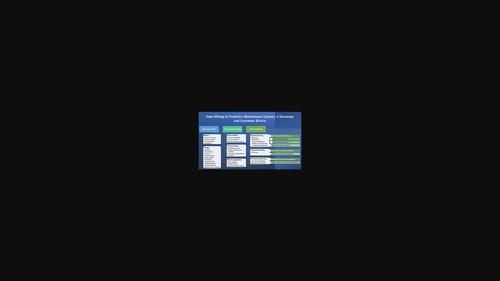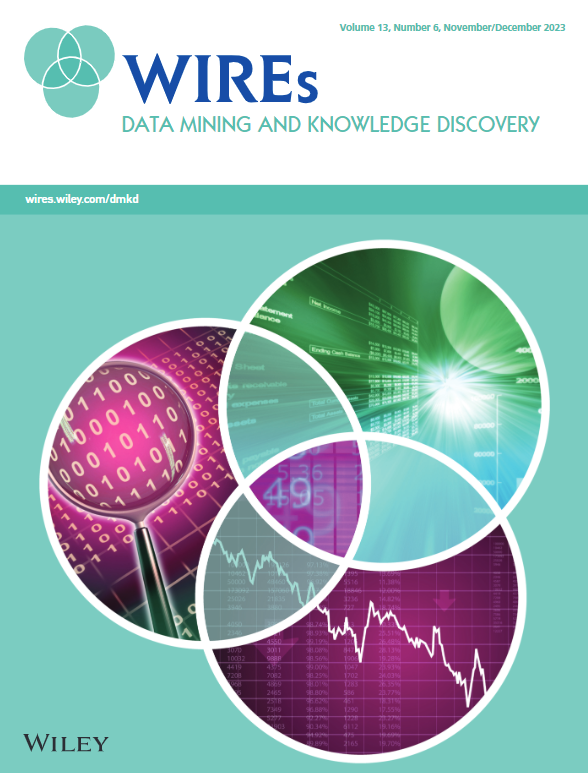Data mining in predictive maintenance systems: A taxonomy and systematic review
IF 11.7
2区 计算机科学
Q1 COMPUTER SCIENCE, ARTIFICIAL INTELLIGENCE
Wiley Interdisciplinary Reviews-Data Mining and Knowledge Discovery
Pub Date : 2022-06-22
DOI:10.1002/widm.1471
引用次数: 14
Abstract
Predictive maintenance is a field of study whose main objective is to optimize the timing and type of maintenance to perform on various industrial systems. This aim involves maximizing the availability time of the monitored system and minimizing the number of resources used in maintenance. Predictive maintenance is currently undergoing a revolution thanks to advances in industrial systems monitoring within the Industry 4.0 paradigm. Likewise, advances in artificial intelligence and data mining allow the processing of a great amount of data to provide more accurate and advanced predictive models. In this context, many actors have become interested in predictive maintenance research, becoming one of the most active areas of research in computing, where academia and industry converge. The objective of this paper is to conduct a systematic literature review that provides an overview of the current state of research concerning predictive maintenance from a data mining perspective. The review presents a first taxonomy that implies different phases considered in any data mining process to solve a predictive maintenance problem, relating the predictive maintenance tasks with the main data mining tasks to solve them. Finally, the paper presents significant challenges and future research directions in terms of the potential of data mining applied to predictive maintenance.

预测性维护系统中的数据挖掘:分类和系统回顾
预测性维护是一个研究领域,其主要目标是优化各种工业系统的维护时间和类型。这个目标包括最大化被监控系统的可用时间,最小化维护中使用的资源数量。由于工业4.0模式下工业系统监控的进步,预测性维护目前正在经历一场革命。同样,人工智能和数据挖掘的进步允许处理大量数据,以提供更准确和先进的预测模型。在这种情况下,许多参与者都对预测性维护研究感兴趣,这成为学术界和工业界融合的计算研究中最活跃的领域之一。本文的目的是进行系统的文献综述,从数据挖掘的角度对预测性维护的研究现状进行概述。本文提出了第一个分类法,该分类法暗示了在解决预测性维护问题的任何数据挖掘过程中考虑的不同阶段,将预测性维护任务与解决预测性维护问题的主要数据挖掘任务联系起来。最后,就数据挖掘在预测性维护中的应用潜力提出了重大挑战和未来的研究方向。
本文章由计算机程序翻译,如有差异,请以英文原文为准。
求助全文
约1分钟内获得全文
求助全文
来源期刊

Wiley Interdisciplinary Reviews-Data Mining and Knowledge Discovery
COMPUTER SCIENCE, ARTIFICIAL INTELLIGENCE-COMPUTER SCIENCE, THEORY & METHODS
CiteScore
22.70
自引率
2.60%
发文量
39
审稿时长
>12 weeks
期刊介绍:
The goals of Wiley Interdisciplinary Reviews-Data Mining and Knowledge Discovery (WIREs DMKD) are multifaceted. Firstly, the journal aims to provide a comprehensive overview of the current state of data mining and knowledge discovery by featuring ongoing reviews authored by leading researchers. Secondly, it seeks to highlight the interdisciplinary nature of the field by presenting articles from diverse perspectives, covering various application areas such as technology, business, healthcare, education, government, society, and culture. Thirdly, WIREs DMKD endeavors to keep pace with the rapid advancements in data mining and knowledge discovery through regular content updates. Lastly, the journal strives to promote active engagement in the field by presenting its accomplishments and challenges in an accessible manner to a broad audience. The content of WIREs DMKD is intended to benefit upper-level undergraduate and postgraduate students, teaching and research professors in academic programs, as well as scientists and research managers in industry.
 求助内容:
求助内容: 应助结果提醒方式:
应助结果提醒方式:


